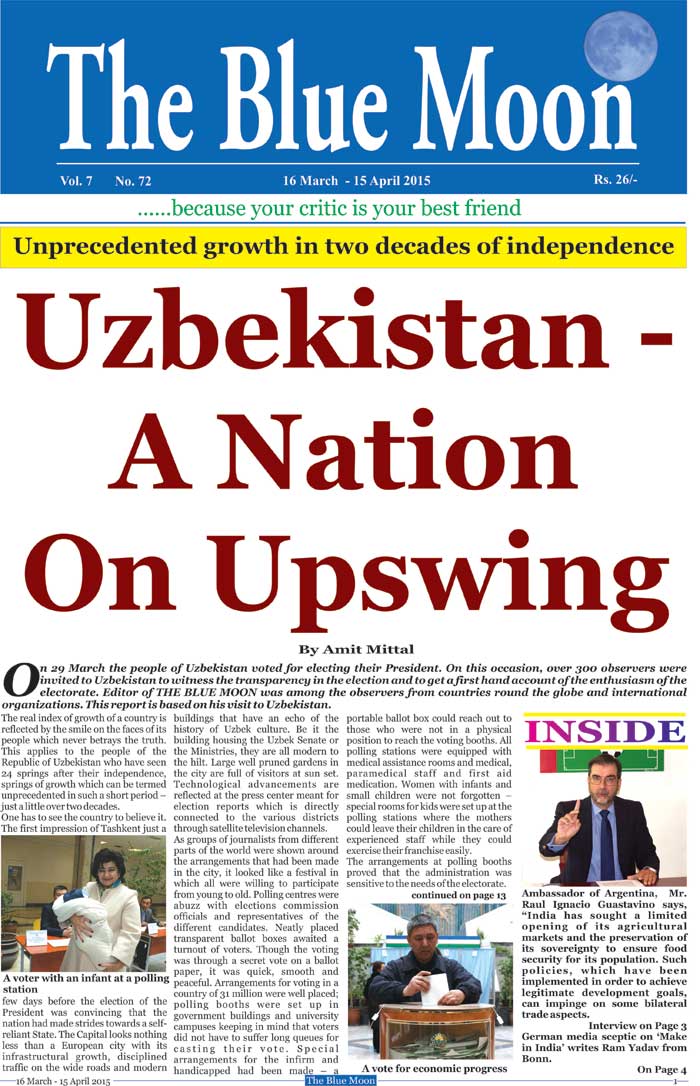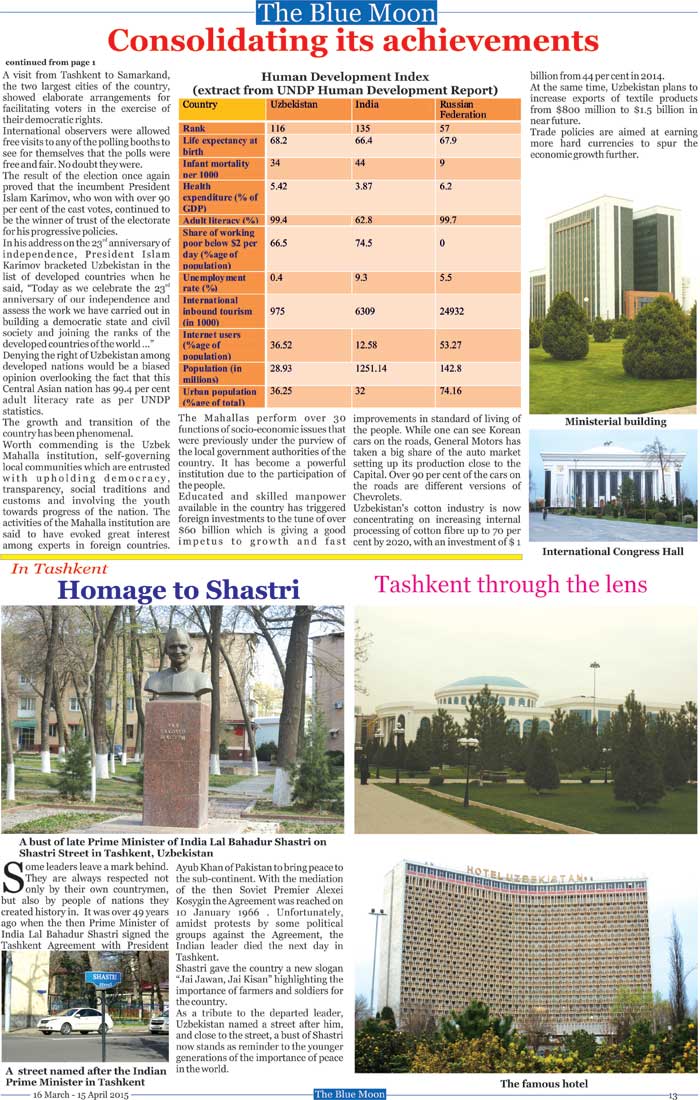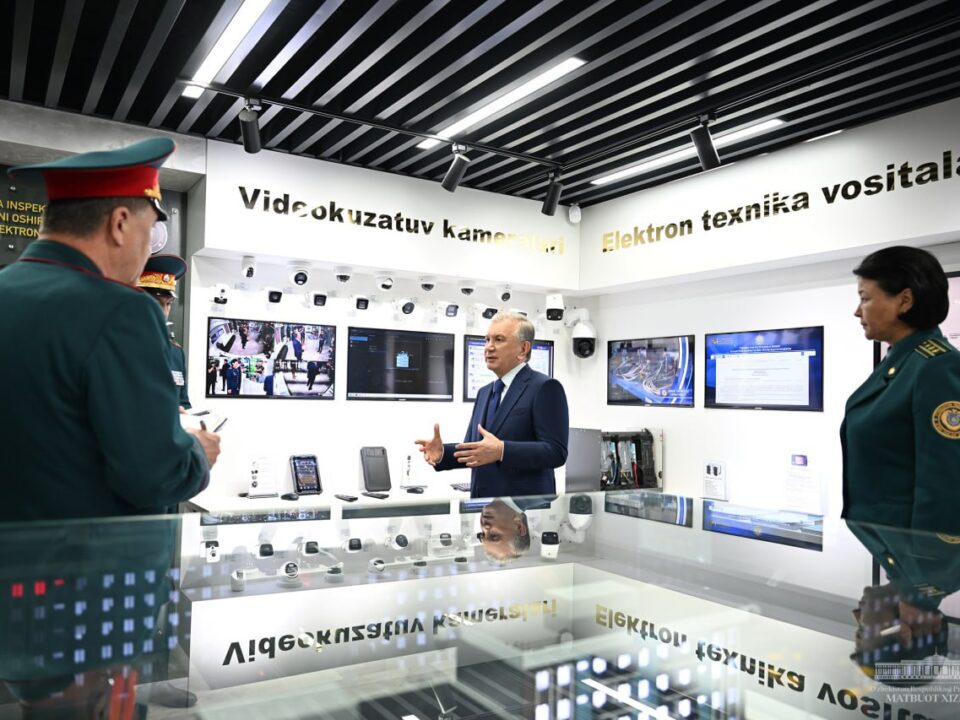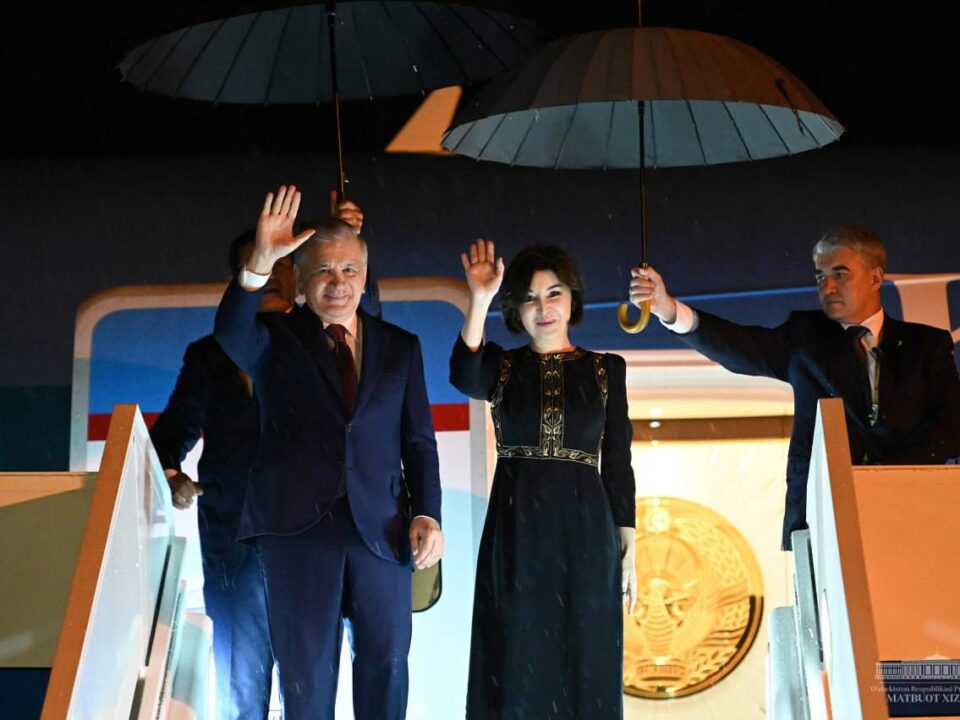By Amit Mittal
 On 29 March the people of Uzbekistan voted for electing their President. On this occasion, over 300 observers were Oinvited to Uzbekistan to witness the transparency in the election and to get a first hand account of the enthusiasm of the electorate. Editor of THE BLUE MOON was among the observers from countries round the globe and international organizations. This report is based on his visit to Uzbekistan.
On 29 March the people of Uzbekistan voted for electing their President. On this occasion, over 300 observers were Oinvited to Uzbekistan to witness the transparency in the election and to get a first hand account of the enthusiasm of the electorate. Editor of THE BLUE MOON was among the observers from countries round the globe and international organizations. This report is based on his visit to Uzbekistan.
The real index of growth of a country is reflected by the smile on the faces of its people which never betrays the truth. This applies to the people of the Republic of Uzbekistan who have seen 24 springs after their independence, springs of growth which can be termed unprecedented in such a short period – just a little over two decades.
One has to see the country to believe it. The first impression of Tashkent just a few days before the election of the President was convincing that the nation had made strides towards a self-reliant State. The Capital looks nothing less than a European city with its infrastructural growth, disciplined traffic on the wide roads and modern buildings that have an echo of the history of Uzbek culture. Be it the building housing the Uzbek Senate or the Ministries, they are all modern to the hilt. Large well pruned gardens in the city are full of visitors at sun set. Technological advancements are reflected at the press center meant for election reports which is directly connected to the various districts through satellite television channels.
As groups of journalists from different parts of the world were shown around the arrangements that had been made in the city, it looked like a festival in which all were willing to participate from young to old. Polling centres were abuzz with elections commission officials and representatives of the different candidates. Neatly placed transparent ballot boxes awaited a turnout of voters. Though the voting was through a secret vote on a ballot paper, it was quick, smooth and peaceful. Arrangements for voting in a country of 31 million were well placed; polling booths were set up in government buildings and university campuses keeping in mind that voters did not have to suffer long queues for casting their vote. Special arrangements for the infirm and handicapped had been made – a portable ballot box could reach out to those who were not in a physical position to reach the voting booths. All polling stations were equipped with medical assistance rooms and medical, paramedical staff and first aid medication. Women with infants and small children were not forgotten – special rooms for kids were set up at the polling stations where the mothers could leave their children in the care of experienced staff while they could exercise their franchise easily.
The arrangements at polling booths proved that the administration was sensitive to the needs of the electorate.
A visit from Tashkent to Samarkand, the two largest cities of the country, showed elaborate arrangements for facilitating voters in the exercise of their democratic rights.
International observers were allowed free visits to any of the polling booths to see for themselves that the polls were free and fair. No doubt they were.
The result of the election once again proved that the incumbent President Islam Karimov, who won with over 90 per cent of the cast votes, continued to be the winner of trust of the electorate for his progressive policies.
In his address on the 23rd anniversary of independence, President Islam Karimov bracketed Uzbekistan in the list of developed countries when he said, “Today as we celebrate the 23rd anniversary of our independence and assess the work we have carried out in building a democratic state and civil society and joining the ranks of the developed countries of the world …” Denying the right of Uzbekistan among developed nations would be a biased opinion overlooking the fact that this Central Asian nation has 99.4 per cent adult literacy rate as per UNDP statistics.
The growth and transition of the country has been phenomenal.
Worth commending is the Uzbek Mahalla institution, self-governing local communities which are entrusted with upholding democracy , transparency, social traditions and customs and involving the youth towards progress of the nation. The activities of the Mahalla institution are said to have evoked great interest among experts in foreign countries.
The Mahallas perform over 30 functions of socio-economic issues that were previously under the purview of the local government authorities of the country. It has become a powerful institution due to the participation of the people.
Educated and skilled manpower available in the country has triggered foreign investments to the tune of over $60 billion which is giving a good impetus to growth and fast improvements in standard of living of the people. While one can see Korean cars on the roads, General Motors has taken a big share of the auto market setting up its production close to the Capital. Over 90 per cent of the cars on the roads are different versions of Chevrolets.
Uzbekistan’s cotton industry is now concentrating on increasing internal processing of cotton fibre up to 70 per cent by 2020, with an investment of $ 1 billion from 44 per cent in 2014.
At the same time, Uzbekistan plans to increase exports of textile products from $800 million to $1.5 billion in near future.
Trade policies are aimed at earning more hard currencies to spur the economic growth further.



























